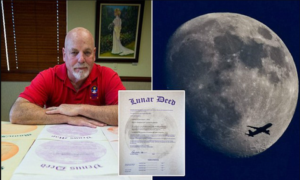Dennis Hope Net Worth:Exploring a Fortune

Dennis Hope’s net worth is estimated to be around $25 million.
As a self-proclaimed extraterrestrial real estate owner, Dennis Hope has captured the imagination of many. He famously claimed ownership of the Moon and other celestial bodies in our solar system through a supposed loophole in the 1967 Outer Space Treaty.
Leveraging this claim, Hope started the Lunar Embassy, a company selling lunar land certificates. Despite the legal validity of such sales being highly questionable, Hope’s unconventional business has attracted global attention and customers, potentially generating a notable income. The intrigue surrounding his lunar real estate venture adds a layer of fascination to his financial narrative, leaving many curious about the true extent of his wealth.
Contents
- 1 Dennis Hope’s Bio
- 2
- 3 The Enigma Of Dennis Hope
- 4 Lunar Land Claims: Legal Or Loophole?
- 5 Moon Estates: A Business Model
- 6 Expanding The Galactic Market
- 7 Net Worth Estimation Challenges
- 8 Public Perception And Influence
- 9 Legal Battles And Controversies
- 10 The Future Of Private Space Ownership
- 11 Conclusion
- 12 >>>Also Read About: Jim Woodford Net Worth
Dennis Hope’s Bio
| Category | Details |
|---|---|
| Full Name | Dennis Lee Hopper |
| Birth Date | May 17, 1936 |
| Place of Birth | Dodge City, Kansas, U.S. |
| Parents | Marjorie Mae (Davis) and James Millard Hopper |
| Siblings | Two brothers (David and Robert) and a sister (Marjorie) |
| Career Highlights | – Child actor in the 1950s, appearing in films like Rebel Without a Cause and Giant |
| – Starred in cult films such as Easy Rider, Apocalypse Now, and Blue Velvet | |
| – Directed films including The Last Movie and Out of the Blue | |
| – Nominated for an Academy Award for Best Supporting Actor for Hoosiers | |
| – Married five times and had four children | |
| Net Worth | Estimated to be around $25 million at the time of his death |
| Height | 5’ 9″ |
| Relationships | – Brooke Hayward (m. 1961-1969) |
| – Michelle Phillips (m. October 31, 1970-November 8, 1970) | |
| – Daria Halprin (m. 1972-1976) | |
| – Katherine LaNasa (m. June 17, 1989-April 1992) | |
| – Victoria Duffy (m. April 13, 1996-2010) |
The Enigma Of Dennis Hope
The Enigma of Dennis Hope has captured imaginations globally. This modern-day celestial entrepreneur’s claim to fame is no ordinary tale. Intriguing as it is, Hope’s story straddles legal loopholes, space oddities, and entrepreneurial spirit. His purported net worth is shrouded in mystique, with speculation fueled by his unconventional business ventures.
Early Life And Career
Before the stars beckoned, Dennis Hope’s life was grounded in the ordinary. Born in the 1940s, he embarked on various careers. Like many entrepreneurs, he experienced highs and lows. Hope’s unique journey to financial notoriety began with an epiphany, not in a boardroom but under the vast expanse of the night sky.
- Multiple early ventures: Experimented in sectors like food and real estate.
- Epiphany amidst adversity: Stumbled upon a celestial idea during tough times.
- Resilience and innovation: Leveraged creativity to overcome challenges.
Origins Of Extraterrestrial Estate
The year 1980 marked a pivot in Dennis Hope’s life. A closer look at international space laws sparked an unconventional idea. He declared ownership of the Moon, citing a perceived loophole in the Outer Space Treaty. He then began selling plots on the Moon—and planets beyond. The business model was simple yet groundbreaking.
| Year | Action | Impact |
| 1980 | Claimed ownership of the Moon | Began lunar real estate venture |
| Late 1980s onwards | Sold extraterrestrial plots | Garnered international attention |
| Subsequent years | Expanded sales to other planets | Alleged increase in net worth |
Fascination with Hope’s enterprise grew, as did his clientele, which purportedly spans celebrities, politicians, and everyday stargazers. The legality remains debated, but the allure of owning a piece of the cosmos proved irresistible to many. Dennis Hope’s venture demonstrates the boundless potential of imagination paired with entrepreneurship.
Lunar Land Claims: Legal Or Loophole?
Dennis Hope’s net worth sparks curiosity often due to his unique claim to fame. His audacious assertion of owning a lunar property raises eyebrows.
But are lunar land claims through a legal channel or just a clever loophole? Delving into Dennis Hope’s lunar empire, we’ll explore this question. We’ll uncover the complexities behind his celestial real estate ventures.
The Outer Space Treaty Interpretation
In 1967, the world’s nations agreed to the Outer Space Treaty. This major treaty said no country could own part of outer space.
Hope, however, interprets this treaty to mean individuals, not countries. This interpretation led him to start selling moon plots.
Experts often debate Hope’s reading of the treaty. Some find it ingenious, while others say it’s flawed.
Challenging International Law
Hope’s claim sparked a major debate in international law. Was he pioneering new territory or sidestepping legal boundaries?
Dennis Hope’s actions put to test the robustness of space law. They challenge decades of international agreements.
Moreover, his success or failure influences the future of commercial outer space activities.
Moon Estates: A Business Model
Dennis Hope’s imaginative venture into selling pieces of the Moon has sparked interest worldwide. His business model revolves around lunar real estate. This novel idea sees Dennis Hope claim ownership of the Moon, citing a loophole in international space law. He sells lunar land certificates, promising buyers a slice of the Moon. Through his company, ‘Lunar Embassy’, a unique market for extraterrestrial property was born.
Selling Lunar Land Certificates
It began with a bold claim and a vision. Dennis Hope started ‘selling’ plots of moon land with certificates as proof of purchase. Each certificate offers buyers ownership of land on the Moon. Hope’s company divides the lunar surface into parcels, selling acres via his online platform. Clients receive a document asserting their claim, detailed with the lunar plot’s geographical coordinates.
Economic Viability And Criticism
The economic model raises eyebrows in both business and legal circles. Selling land on a celestial body is unconventional, leading many to question its legitimacy. Critics argue international treaties render such sales moot. Others see it as a novelty, a playful investment. Despite this, Hope’s business persists. Thousands have dished out dollars for their lunar claims, showing the concept’s unique appeal.
- Legality under international law is debated.
- Novel concept with a global customer base
- Space law experts are usually critical of the business model
Expanding The Galactic Market
Imagine shopping, not for the next block’s real estate but for a piece of the cosmos. This soaring concept has found footing thanks to Dennis Hope. Since 1980, Hope has claimed ownership of the Moon and other planetary bodies, captivated imaginations, and sparked a fascinating economic discussion. His off-world claims gave rise to a unique market niche.
Other Celestial Bodies For Sale
The Moon isn’t the only product in Dennis Hope’s galactic inventory. Mars, Venus, and Io, one of Jupiter’s moons, grace his celestial catalogue. Delight in the thought of owning a plot on these distant worlds:
- Mars: Red soil heaven, awaiting your claim.
- Venus: Earth’s twin, shrouded in mystery.
- Io: A volcanic spectacle outside our world.
Marketing Tactics And Publicity
Dennis Hope’s marketing genius cannot be overstated. Attracting global clients, he’s proven that the sky’s not the limit. His strategies involve:
- Engaging media with the stunning idea of space ownership.
- Captivating advertising showcasing celestial splendour.
- Creating a community of extraterrestrial property owners.
Each move created a buzz, bringing galactic dreams closer to Earth.
Net Worth Estimation Challenges
Understanding Dennis Hope’s net worth involves complex challenges. Traditional methods fall short. Let’s explore the unique issues faced.
Quantifying Intangible Assets
Estimating the worth of intangible assets is tricky. Dennis Hope’s claim to lunar property ownership is uncharted territory, not backed by Earth’s laws, making valuation difficult.
What counts as an asset? His lunar deeds. They need a clear market value, though. This raises questions:
- Do these assets have real value?
- Can they be sold like traditional property?
Profits from sales suggest value. Yet, without official recognition, it’s mostly speculative.
Assessing The Value Of Hope’s Empire
Determining the empire’s value requires a different approach. We must consider:
- Hope’s company revenues.
- Media attention and influence.
- Overall market interest.
Public interest drives the empire’s perceived value. Product uniqueness adds to it. As does Hope’s entrepreneurial spirit.
Yet, no exact figure exists. Hope’s net worth estimation remains guesswork.
Public Perception And Influence
Dennis Hope’s claim to ownership of lunar property has sparked significant attention and discussion. He has become a notable figure in the space community, with diverse opinions shaping his public image. Let’s explore the differing views and the influence he wields among space enthusiasts.
Hope’s Critiques And Defenders
Critiques challenge the legality of Hope’s claims. They cite the Outer Space Treaty as a key opposing argument. This international treaty states that no country may claim sovereignty over celestial bodies. Hope’s defenders, however, point to his creative interpretation of the treaty and note his role in expanding public interest in space law and ownership.
- Questions of legitimacy surround his lunar real estate business.
- Supporters argue for his innovative approach and entrepreneurship.
Impact On Space Enthusiasts
Hope’s story has inspired curiosity among space fans, who admire his visionary spirit. His actions have encouraged people to learn more about space exploration and property rights, fueling important conversations about the future of space governance.
| Influence on Public | Influence on the Space Sector |
| Stir’s debate on space ownership. | Pressures clarification of space laws. |
| Engages people with space commerce. | Highlights need for policymaking. |
Space buffs may not agree with Hope’s methods. Yet, they unanimously recognize his impact on the space conversation.
Legal Battles And Controversies
Dennis Hope has sparked intrigue and debate over his claims of owning lunar real estate. This unconventional endeavour has inevitably led to a series of legal challenges. Let’s dive into the legal intricacies and heated disputes surrounding his controversial business practices.
Notable Lawsuits And Disputes
The journey of Dennis Hope’s lunar land claims is not without legal pushback. Numerous parties have contested his rights to sell extraterrestrial property. Here are key cases:
- Challenge from the UN: He faced objections based on the Outer Space Treaty.
- Consumer lawsuits: Buyers dissatisfied with their purchases have sued for false advertising.
Regulatory Scrutiny And Compliance
Regulators have questioned the legitimacy of Hope’s business model. Compliance with international space law remains a contentious issue. Significant points include:
- Space Law Adherence: Authorities scrutinize his compliance with space treaties.
- Property Rights Enforcement: Experts debate the enforceability of his property claims.
The Future Of Private Space Ownership
As we stand at the brink of a new era, private space ownership is not just a dream but a burgeoning reality. Pioneers like Dennis Hope have ignited a conversation that’s both complex and fascinating, blending legal challenges with entrepreneurial spirit. This section delves into the evolution of space property rights and Dennis Hope’s lasting mark on the realm of space commerce.
Evolution Of Space Property Rights
Space, once the playfield of nations, is now opening its doors to private entities. With this shift, the discourse around space property rights has accelerated. It’s no longer a question of ‘if’ but ‘when’ and ‘how’ these rights will be recognized and regulated. Legal frameworks are being scrutinized and evolved as companies gear up to claim their stake beyond Earth’s atmosphere.
- Outer Space Treaty of 1967: A foundation for space law
- National legislations adapt to growing private sector interest
- International dialogues on potential amendments
Hope’s Legacy In Space Commerce
Dennis Hope’s claim to lunar land has sparked both intrigue and scepticism since his audacious move in 1980. As the self-proclaimed ‘Head Cheese’ of the Lunar Embassy, Hope sold lunar land certificates, stirring the pot of space commerce discourse. His legacy? A provocative debate on the commercialization of space and a future where private property rights could extend beyond the stars.
- Stimulated legal debates on extraterrestrial property sales
- Inspired entrepreneurs to consider space-based ventures
- Shaped public perception of space as a frontier for business
Dennis Hope’s actions have set a precedent that space commerce, once a subject of science fiction, is fast becoming a reality. His contribution to the dialogue on private space ownership holds both weight and wonder as humanity reaches for the stars.
Conclusion
Wrapping up our exploration of Dennis Hope’s financial status, it’s clear his story captivates many. His claim to lunar property rights demonstrates unconventional approaches can lead to noteworthy gains. Aspiring entrepreneurs might draw inspiration from Hope’s unique business model. Whether his net worth skyrockets or stays grounded, Dennis Hope’s tale remains a fascinating study of creativity and savvy.
>>>Also Read About: Jim Woodford Net Worth




